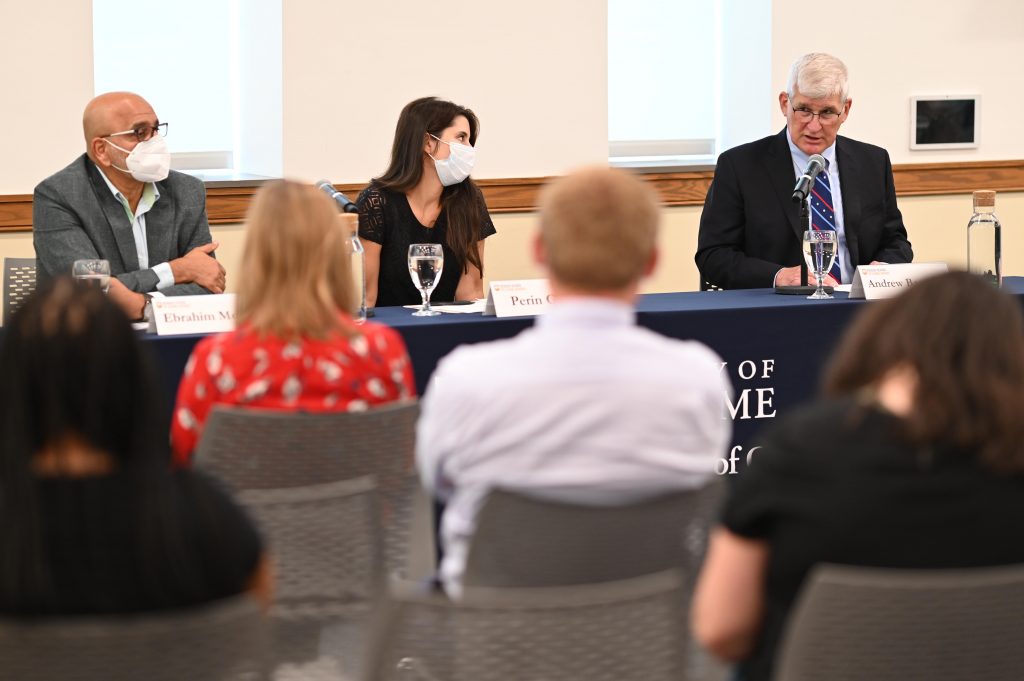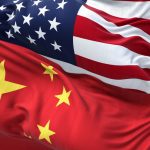The terrorist attacks of September 11 and the response to them have shaped the world in profound ways, creating a global climate of conflict that now hangs over a new generation of rising leaders. For today’s college students, the United States has always been at war.
What conversations have they inherited? How has September 11 shaped their perceptions of religion, global affairs, and democracy? Now, twenty years after the attacks, is it possible to change the conversation and better work toward peace and justice?
A new Keough School policy conversation series explores these questions, bringing together a diverse group of experts to share insights that can inform public conversation and inspire activists, academics, government officials, and policymakers to work for change.
The series began September 1 with a discussion featuring Andrew Bacevich, a prominent critic of current US foreign policy. Bacevich, a Vietnam War veteran who retired from the US Army after a career that spanned more than two decades, now serves as president of the Quincy Institute for Responsible Statecraft, advocating for new and innovative approaches to security challenges.
He is professor emeritus of international relations and history at Boston University and a prolific author whose most recent work, After the Apocalypse: America’s Role in a World Transformed, explores how US foreign policy must adapt to meet the challenges of the 21st century.
New approaches to emerging security threats
“The existing paradigm, which emerged at the end of World War II, focuses on threats ‘out there’—in Europe, in East Asia, in the Middle East,” Bacevich said during the September 1 discussion. “And that prevailing paradigm emphasizes amassing and using military power as the essential response to those threats. The new paradigm should prioritize threats that endanger Americans where they live.”
These new threats, he said, include pandemics such as COVID-19; climate change and the natural disasters it exacerbates—everything from wildfires to floods to hurricanes; porous borders that facilitate the trafficking of guns and drugs as well as human trafficking; an extensive and intrusive surveillance regime; the erosion of trust in government institutes; political dishonesty; and the disuniting of American society, which Bacevich said stems in large part from unresolved racial justice issues.
He pointed to the United States’ exit from Afghanistan, and its failure to stand up a viable state after 20 years of occupation as a stark reminder that a Cold War approach to foreign policy will no longer work.
“The real story here is not what happened over the past couple of weeks,” he said. “The real story here is what happened over the past 20 years.”
Critiquing a Cold War mentality
Panelists expanded on Bacevich’s arguments, emphasizing how the United States’ response to the September 11 attacks had failed to achieve its aims and contributed to a climate of conflict.
Jamila Afghani, founder and president of Women’s International League for Peace & Freedom Afghanistan, wept as she detailed the toll the last two decades of war have taken on her country and its people.
“I hope the international community will also listen to the people of Afghanistan” she said, “to the people of other countries that have suffered because of the wrong management of US and NATO . . . for their own power, for their own benefit, which has cost us our lives and our future and the future of our children.”
The current situation, Afghani said, “is the start of another misery . . . for our nation, for our people.” Now, having fled the country, after the Taliban took power, she worries about the future of human rights—and women’s rights in particular.
“One of the calls of the international community was to help Afghanistan . . . support the women of Afghanistan,” she said. “But they left us behind . . .”
Perin Gürel, associate professor of American studies at the University of Notre Dame, echoed Bacevich’s critique of US foreign policy, pointing out how the Bush administration used the September 11 attacks as a new Pearl Harbor that justified widespread military conflict. She urged policymakers to embrace new ways of thinking about global challenges.
“The phrase ‘the space left by the United States will be filled by (blank)’—sometimes Iran, China, Russia, etc.—makes it clear that even liberals, or maybe especially liberals, continue to believe that spaces far, far across the Atlantic somehow belong to the United States by right. And the United States, if not perfectly good, is somehow better,” she said. “This delusion is maintained by a bizarre Cold War nostalgia that simply refuses to go away.”
Moving beyond a military-first approach
Ebrahim Moosa, Mirza Family Professor of Islamic Thought and Muslim Societies for the Keough School of Global Affairs, also called for new ways of thinking.
“It is American exceptionalism that brought us 9/11,” he said. “We thought we could intervene in global events, side with occupation, perform acts of violence around the world, without any consequences.”
And the response to the attacks led to more deaths and violence, Moosa said.
“What happened on September 11, 2001, were crimes against innocent civilians in New York, Washington and those who perished in the fields of Pennsylvania,” he said. “What happened in its wake in Afghanistan and Iraq were unjustified and unmitigated acts of aggression and occupation by the United States and its European allies against two entire countries, against world opinion.”
How might a different response have worked? In response to questions from the audience, Bacevich called for a cooperative and international law enforcement approach rather than a massive military response. Such a targeted response would address real threats with far less violence, he said.
“The proper course was to see that heinous act as a criminal act undertaken by a criminal conspiracy with international reach,” Bacevich said. “How do you respond to a criminal conspiracy of that scale? You organize an international police response . . . . It would involve the careful collaboration of international intelligence agencies and probably special operations forces—an international collaborative effort that would root out and destroy the conspiracy.”
Continuing the conversation
September 1 was the first discussion in the policy conversation series. The series will continue on October 6, when panelists will examine how world crises are connected to the conditions of conflict that worsened after September 11. It will conclude on November 3, as participants explore whether countries can find ways to forge a more cooperative global community.
The series is presented by the Keough School of Global Affairs and its Ansari Institute for Global Engagement with Religion, and co-sponsored by the Keough School’s Kellogg Institute for International Studies, Klau Center for Civil and Human Rights, Kroc Institute for International Peace Studies, Liu Institute for Asia and Asian Studies, and Nanovic Institute for European Studies.
Top Photo: Left to right, panelists Ebrahim Moosa, Mirza Family Professor of Islamic Thought and Muslim Societies; Perin Gürel, associate professor of American studies; and Andrew Bacevich, president of the Quincy Institute for Responsible Statecraft.



